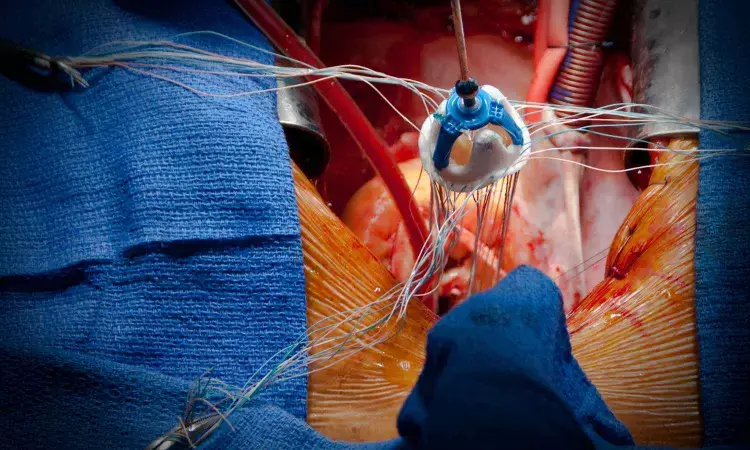- Home
- Medical news & Guidelines
- Anesthesiology
- Cardiology and CTVS
- Critical Care
- Dentistry
- Dermatology
- Diabetes and Endocrinology
- ENT
- Gastroenterology
- Medicine
- Nephrology
- Neurology
- Obstretics-Gynaecology
- Oncology
- Ophthalmology
- Orthopaedics
- Pediatrics-Neonatology
- Psychiatry
- Pulmonology
- Radiology
- Surgery
- Urology
- Laboratory Medicine
- Diet
- Nursing
- Paramedical
- Physiotherapy
- Health news
- Fact Check
- Bone Health Fact Check
- Brain Health Fact Check
- Cancer Related Fact Check
- Child Care Fact Check
- Dental and oral health fact check
- Diabetes and metabolic health fact check
- Diet and Nutrition Fact Check
- Eye and ENT Care Fact Check
- Fitness fact check
- Gut health fact check
- Heart health fact check
- Kidney health fact check
- Medical education fact check
- Men's health fact check
- Respiratory fact check
- Skin and hair care fact check
- Vaccine and Immunization fact check
- Women's health fact check
- AYUSH
- State News
- Andaman and Nicobar Islands
- Andhra Pradesh
- Arunachal Pradesh
- Assam
- Bihar
- Chandigarh
- Chattisgarh
- Dadra and Nagar Haveli
- Daman and Diu
- Delhi
- Goa
- Gujarat
- Haryana
- Himachal Pradesh
- Jammu & Kashmir
- Jharkhand
- Karnataka
- Kerala
- Ladakh
- Lakshadweep
- Madhya Pradesh
- Maharashtra
- Manipur
- Meghalaya
- Mizoram
- Nagaland
- Odisha
- Puducherry
- Punjab
- Rajasthan
- Sikkim
- Tamil Nadu
- Telangana
- Tripura
- Uttar Pradesh
- Uttrakhand
- West Bengal
- Medical Education
- Industry
Early surgery for acute active infective endocarditis feasible soon after stroke, claims study

Researchers reported in a new study that early-valve surgery in acute infective endocarditis with preoperative stroke is feasible and non-inferior for postoperative stroke risk. This conclusion was drawn from a comprehensive review of an institutional database related to the timely surgical intervention can safely be considered in this high-risk population. The study was published by Kareem Wasef and colleagues in The Annals of Thoracic Surgery.
Acute infective endocarditis is usually associated with serious complications like acute stroke. The appropriate timing of valve repair or replacement in these patients is controversial because an increased incidence of hemorrhagic conversion has been reported in these patients. The optimal timing for surgery greatly influences the outcome of the patients. The present study evaluated the outcome of early valve surgery in comparison with delayed surgery among patients who had a preoperative stroke caused by acute endocarditis.
This was a retrospective review using an institutional Society of Thoracic Surgeons database including all patients who underwent valve surgery for active infective endocarditis from 2016 to 2024. Electronic medical records provided stroke details and longitudinal follow-up. Descriptive statistics and Kaplan-Meier survival curves assessed outcomes and survival rates.
Results
This research involved 656 patients who underwent surgery because of acute active infective endocarditis. Of these, preoperative stroke happened with 98 patients, which is 14.9%: 86 patients (87.8%) developed embolic strokes, 16 (18.6%) developed micro-hemorrhages, and 12 (12.2%) developed hemorrhagic strokes. The mean time from the diagnosis of preoperative stroke to surgery was 5.5 days.
• The overall postoperative stroke incidence was 2.1%: 14 of 656 patients.
• No statistically significant difference was observed in postoperative stroke rates between patients with and those without a preoperative stroke (4.1% vs 1.8%, P = 0.148).
• There were more cases of postoperative hemorrhagic stroke in the preoperative stroke group as well, at a rate of 3.1% compared to 0.5% (.
• Early surgery (within 72 h) in patients with preoperative stroke did not increase the incidence of postoperative stroke (2.6% vs. 5.0%; p=0.564).
This study has therefore established that patients with acute infective endocarditis and who have had preoperative stroke are associated with similar outcomes to those without preoperative stroke. Although there is a higher incidence of postoperative hemorrhagic strokes among the preoperative stroke group, the risk of postoperative stroke did not differ significantly and thereby supported the feasibility of early surgical intervention.
These results are especially relevant for clinicians treating patients with endocarditis complicated by stroke, providing evidence that early surgery does not exacerbate postoperative stroke risk. The slightly higher risk of hemorrhagic conversion mandates serious patient selection and perioperative management.
This study demonstrated that early-valve surgery for acute endocarditis in patients with a preoperative stroke is feasible and safe. In particular, noninferior postoperative stroke risk was evidenced in this high-risk population, which supports early surgical intervention that may improve patient outcomes. Further studies are thus warranted to further refine the selection of patients and optimize the quality of perioperative care with the aim of reducing the risk of hemorrhagic conversion.
Reference:
Dr Riya Dave has completed dentistry from Gujarat University in 2022. She is a dentist and accomplished medical and scientific writer known for her commitment to bridging the gap between clinical expertise and accessible healthcare information. She has been actively involved in writing blogs related to health and wellness.
Dr Kamal Kant Kohli-MBBS, DTCD- a chest specialist with more than 30 years of practice and a flair for writing clinical articles, Dr Kamal Kant Kohli joined Medical Dialogues as a Chief Editor of Medical News. Besides writing articles, as an editor, he proofreads and verifies all the medical content published on Medical Dialogues including those coming from journals, studies,medical conferences,guidelines etc. Email: drkohli@medicaldialogues.in. Contact no. 011-43720751


